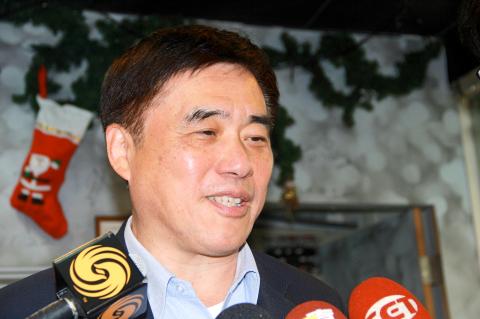An initiative launched by the Chinese Nationalist Party’s (KMT) younger members advocating party reform yesterday announced that it would hold a forum to invite KMT chairmanship candidates to answer questions regarding their plans for the party.
“We are going to hold a forum called ‘Chairman, may I ask a question?’ in the hopes of understanding the candidates’ plans to reform the party and subject them to public scrutiny,” the Grassroots Alliance said in a press statement.
The alliance said a number of KMT members have announced that they would run for party chairmanship, including Deputy Legislative Speaker Hung Hsiu-chu (洪秀柱), former KMT vice chairman Hau Lung-bin (郝龍斌) and Taipei City councilors Lee Hsin (李新) and Chung Hsiao-ping (鍾小平).

Photo: CNA
However, their election manifestos are merely slogans and lack substantial plans for reform, the alliance said.
“That is why we will extend an open invitation to the party chariperson hopefuls and ask them to explain what kinds of reforms they plan to implement,” the statement said.
The alliance was established by a group of younger KMT members on Tuesday following the party’s defeat in the presidential and legislative elections on Saturday last week, with the goals of acknowledging young KMT members’ subjectivity, transforming the KMT into a Taiwan-centric party and bringing the party in line with grassroots voters.
Among the alliance’s members are former KMT Youth League Secretary-General Lee Zheng-hao (李正皓), former KMT International Information and Events Center director Hsu Chiao-hsin (徐巧芯) and KMT Youth League head Hsiao Ching-yan (蕭敬嚴).
As of yesterday, about 2,000 people had signed an online petition endorsing the alliance’s reform plans, which include lowering the hefty registration fee for entering the KMT’s chairperson elections, dealing with the party’s contentious assets and promoting youth participation in politics.
The alliance said while the next KMT chairperson election, which is to be held on March 26, is the party’s internal matter, the party’s next chairperson would inevitably need to persuade the public to embrace the KMT again.
“For this reason, all interested individuals will be allowed to attend the forum instead of just KMT members. The event will be broadcast live over the Internet,” the alliance said, urging the public to become a part of the KMT’s reform movement.

Chinese Nationalist Party (KMT) Chairman Eric Chu (朱立倫), spokeswoman Yang Chih-yu (楊智伃) and Legislator Hsieh Lung-chieh (謝龍介) would be summoned by police for questioning for leading an illegal assembly on Thursday evening last week, Minister of the Interior Liu Shyh-fang (劉世芳) said today. The three KMT officials led an assembly outside the Taipei City Prosecutors’ Office, a restricted area where public assembly is not allowed, protesting the questioning of several KMT staff and searches of KMT headquarters and offices in a recall petition forgery case. Chu, Yang and Hsieh are all suspected of contravening the Assembly and Parade Act (集會遊行法) by holding

PRAISE: Japanese visitor Takashi Kubota said the Taiwanese temple architecture images showcased in the AI Art Gallery were the most impressive displays he saw Taiwan does not have an official pavilion at the World Expo in Osaka, Japan, because of its diplomatic predicament, but the government-backed Tech World pavilion is drawing interest with its unique recreations of works by Taiwanese artists. The pavilion features an artificial intelligence (AI)-based art gallery showcasing works of famous Taiwanese artists from the Japanese colonial period using innovative technologies. Among its main simulated displays are Eastern gouache paintings by Chen Chin (陳進), Lin Yu-shan (林玉山) and Kuo Hsueh-hu (郭雪湖), who were the three young Taiwanese painters selected for the East Asian Painting exhibition in 1927. Gouache is a water-based

Taiwan would welcome the return of Honduras as a diplomatic ally if its next president decides to make such a move, Minister of Foreign Affairs Lin Chia-lung (林佳龍) said yesterday. “Of course, we would welcome Honduras if they want to restore diplomatic ties with Taiwan after their elections,” Lin said at a meeting of the legislature’s Foreign Affairs and National Defense Committee, when asked to comment on statements made by two of the three Honduran presidential candidates during the presidential campaign in the Central American country. Taiwan is paying close attention to the region as a whole in the wake of a

OFF-TARGET: More than 30,000 participants were expected to take part in the Games next month, but only 6,550 foreign and 19,400 Taiwanese athletes have registered Taipei city councilors yesterday blasted the organizers of next month’s World Masters Games over sudden timetable and venue changes, which they said have caused thousands of participants to back out of the international sporting event, among other organizational issues. They also cited visa delays and political interference by China as reasons many foreign athletes are requesting refunds for the event, to be held from May 17 to 30. Jointly organized by the Taipei and New Taipei City governments, the games have been rocked by numerous controversies since preparations began in 2020. Taipei City Councilor Lin Yen-feng (林延鳳) said yesterday that new measures by